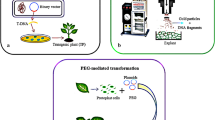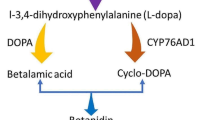Abstract.
A major limitation in producing transgenic soybeans [Glycine max (L.) Merrill] using the Agrobacterium-mediated cotyledonary-node method is low-frequency T-DNA transfer from Agrobacterium tumefaciens into cotyledonary-node cells. We increased Agrobacterium infection from 37% to 91% of explants in the cotyledonary-node region by amending the solid co-cultivation medium with L-cysteine, which resulted in a fivefold increase in stable T-DNA transfer in newly developed shoot primordia. Southern analysis detected greater than a twofold increase in transformation efficiency, as determined by the number of independent fertile, transgene plants per explants inoculated. Enzymatic browning on explant tissue was also reduced, which suggests cysteine may interact with wound- and pathogen-defense responses in the soybean explant, resulting in an increased T-DNA delivery into the cotyledonary-node cells.
Similar content being viewed by others
Author information
Authors and Affiliations
Additional information
Revision received: 15 June 2001
Electronic Publication
Rights and permissions
About this article
Cite this article
Olhoft, P., Somers, D. L-Cysteine increases Agrobacterium-mediated T-DNA delivery into soybean cotyledonary-node cells. Plant Cell Rep 20, 706–711 (2001). https://doi.org/10.1007/s002990100379
Received:
Accepted:
Published:
Issue Date:
DOI: https://doi.org/10.1007/s002990100379




